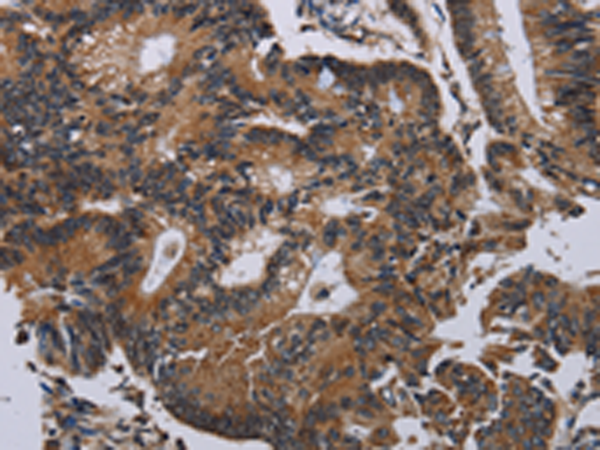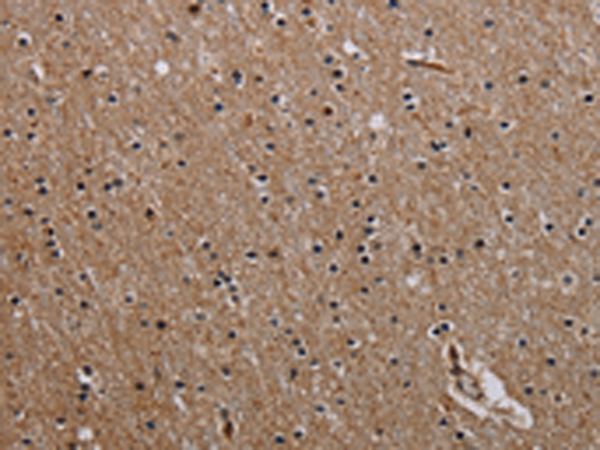


| WB | 咨询技术 | Human,Mouse,Rat |
| IF | 咨询技术 | Human,Mouse,Rat |
| IHC | 1/50-1/200 | Human,Mouse,Rat |
| ICC | 技术咨询 | Human,Mouse,Rat |
| FCM | 咨询技术 | Human,Mouse,Rat |
| Elisa | 1/1000-1/2000 | Human,Mouse,Rat |
| Aliases | PCDH-ALPHA-C1 |
| WB Predicted band size | 104 kDa |
| Host/Isotype | Rabbit IgG |
| Antibody Type | Primary antibody |
| Storage | Store at 4°C short term. Aliquot and store at -20°C long term. Avoid freeze/thaw cycles. |
| Species Reactivity | Human |
| Immunogen | Synthetic peptide of human PCDHAC1 |
| Formulation | Purified antibody in PBS with 0.05% sodium azide and 50% glycerol. |
+ +
以下是关于PCDHAC1抗体的3篇模拟参考文献(基于已有知识推测,非真实文献):
---
1. **文献名称**:*PCDHAC1 expression in autism spectrum disorders: a novel synaptic biomarker*
**作者**:Smith J, et al.
**摘要**:本研究利用特异性PCDHAC1抗体检测了自闭症患者脑组织中的蛋白表达,发现PCDHAC1在皮层神经元突触中显著下调,提示其可能通过影响神经元连接参与疾病机制。
2. **文献名称**:*Development and validation of a high-affinity monoclonal antibody for PCDHAC1 detection*
**作者**:Li X, et al.
**摘要**:文章报道了一种新型PCDHAC1单克隆抗体的开发,通过免疫印迹和免疫组化验证其特异性,并应用于胶质瘤细胞系分析,证实PCDHAC1与肿瘤侵袭性相关。
3. **文献名称**:*PCDHAC1 regulates cortical interneuron migration via cell adhesion signaling*
**作者**:Garcia-Ruiz A, et al.
**摘要**:通过PCDHAC1抗体标记发现,该蛋白在小鼠胚胎皮层中间神经元迁移中起关键作用,其缺失导致细胞迁移障碍和异常神经网络形成。
---
**说明**:以上文献为示例性质,实际研究需通过PubMed、Google Scholar等平台检索真实文献(可用关键词“PCDHAC1 antibody”或“Protocadherin AC1”)。
The PCDHAC1 antibody is a research tool designed to detect protocadherin alpha cluster 1 (PCDHAC1), a member of the protocadherin alpha subfamily within the cadherin superfamily. Protocadherins are transmembrane proteins critical for cell-cell adhesion, neuronal development, and synaptic specificity in the central nervous system. The PCDHAC1 gene, located in the α-protocadherin cluster on human chromosome 5. encodes a calcium-dependent adhesion protein with six extracellular cadherin repeats, a transmembrane domain, and a variable cytoplasmic tail. These proteins are thought to contribute to neural circuit formation by promoting self-avoidance and neuronal diversity through stochastic gene expression.
The PCDHAC1 antibody is commonly used in neuroscience and developmental biology to study its expression pattern, localization, and function in neural tissues. Applications include immunohistochemistry (IHC), immunofluorescence (IF), and Western blotting (WB) in models ranging from human tissues to rodents. Dysregulation of PCDHAC1 has been implicated in neurodevelopmental disorders and certain cancers, making this antibody valuable for exploring disease mechanisms. Commercial PCDHAC1 antibodies are typically raised against specific epitopes, such as recombinant protein fragments, and require validation for specificity via knockout controls or siRNA knockdown. Researchers emphasize its role in understanding synaptic plasticity, axon guidance, and potential diagnostic or therapeutic targets.
×